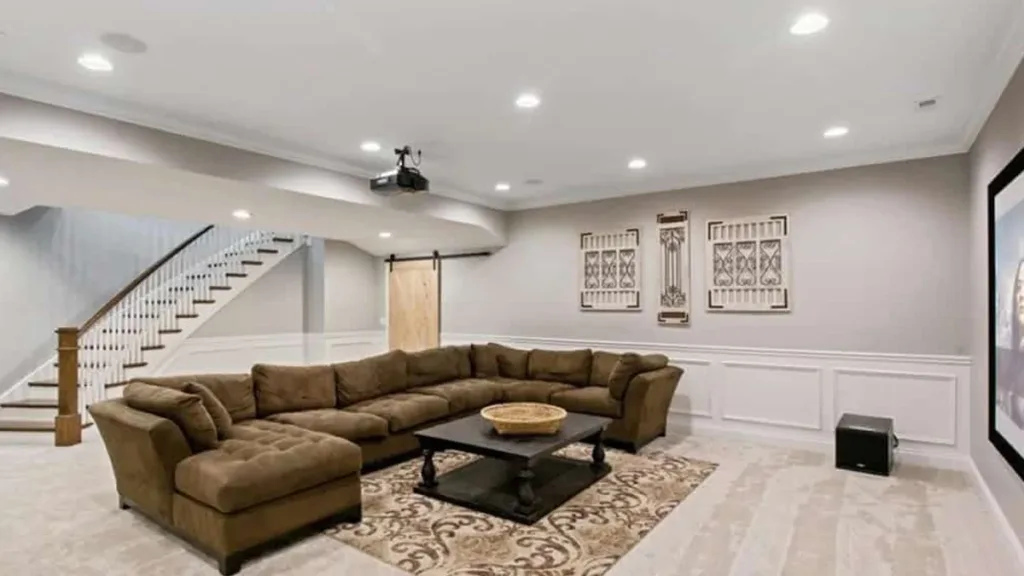The basement is an often-overlooked space in a home that has the potential to be transformed into a functional and stylish living area. A well-done basement remodel can increase the value of a home and add valuable square footage. However, embarking on such a project can be costly. Here, we explore the factors that influence the cost to finish a basement, including average cost breakdowns, additional expenses, and cost-saving strategies.
Factors Influencing the Cost
Size of the Basement: The size of the basement will inevitably affect the overall cost of a remodel. A larger basement will require more materials, labor, and time, driving up the cost.
Scope of the Remodel: The level of renovation that the basement requires will also affect the cost. A simple remodel, such as painting, flooring, and lighting, will cost less than adding rooms or a bathroom, installing custom features, and advanced systems.
Materials and Finishes: The choice of materials and finishes will significantly affect remodeling costs. High-end finishes, such as hardwood floors or marble tiles, will cost more than laminate flooring or porcelain tiles. Custom cabinetry will cost more than pre-made.
Labor and Contractor Fees: The cost of labor will be determined by the scope of the remodel. A simple remodel will cost less than one that involves extensive work. The choice of contractor will also affect overall costs, with more experienced or specialized contractors charging more for their services.
Permits and Inspections: Permits and inspections are necessary parts of a basement remodel. The cost of permits and inspections will be influenced by the region and the local government agency responsible for issuing these permits.
Average Cost Breakdown for a Basement Remodel
Basic Remodeling: A simple basement remodel that includes painting, flooring, and lighting costs between $6,000 and $15,000. This type of remodeling does not require any plumbing, electrical, or structural work.
Mid-Range Remodeling: For a mid-range remodel that includes adding a room, such as an office or bedroom, with improved insulation and new windows, the cost to finish a basement can range from $15,000 to $40,000. This type of remodel might require some plumbing or electrical work, which can increase the overall cost.
High-End Remodeling: A luxurious basement remodel that includes custom features, such as a wet bar or a home theater, can cost anywhere from $40,000 to $100,000. This level of remodeling involves extensive structural renovations as well as plumbing, electrical, and HVAC system upgrades.
Additional Costs Associated with a Basement Remodel
Design and Architectural Services: The cost of design and architectural services depends on the scope of the remodel and the level of customization required. Depending on the experience of the personnel, it can cost between $500 and $10,000.
Structural Repairs and Modifications: Structural repairs and modifications are necessary when a basement remodel involves a redesign or reconfiguration of the space. Cost can vary from $3,000 to $10,000.
Plumbing and Electrical Work: Plumbing and electrical work may be necessary for a basement remodel that includes a bathroom or a wet bar area. Costs for these renovations will depend on the complexity of the work and will reflect the cost of the materials used.
Furniture and Decor: The cost of furniture and decor will vary according to style and quality. A high-end remodel might require custom furniture, while a lower-end remodel can use pre-fabricated pieces. However, the cost of furniture and decor is a small part of the total remodel cost, usually around 10%.
Contingency Budget: A contingency budget of up to 10% of the overall cost of the remodel is recommended to address unexpected expenses, such as materials or labor fluctuations.
Cost-Saving Strategies for a Basement Remodel
DIY vs. Hiring Professionals: Depending on the project’s complexity, some homeowners may consider doing the work themselves to save money. However, a complex basement remodel involving plumbing, electrical, and structural work should be left to the professionals to avoid costly mistakes.
Material Selection and Sourcing: Careful selection of materials and finishes can also save costs. For example, opting for laminate instead of hardwood flooring or porcelain tiles instead of natural stone can reduce material expenses. Additionally, sourcing materials from discount stores or wholesale distributors may help save costs.
Budget-Friendly Design Choices: Budget-friendly design choices include keeping the basement’s layout the same, using pre-made cabinets, and choosing light-colored paint to make the space feel larger. Additionally, using less complicated finishes, such as wood or tile, can save money compared to marble or granite.
Comparing Multiple Quotes: Comparing contractors’ quotes is an excellent way to ensure that you’re getting a good deal. While it’s tempting to go with the lowest quote, ensure that the home remodeling contractor is reputable and experienced.
Local Building Regulations: Local building regulations also play a role in determining the cost of a basement remodel. Depending on where you live, there may be specific requirements for ventilation, plumbing, and insulation that can affect the overall cost. Renovating a basement is an exciting and rewarding project, but it can be expensive. Understanding the various elements of remodeling costs will help you create a budget that fits your needs and allows for unexpected expenses. With careful planning and research, it’s possible to complete a beautiful basement remodel without breaking the bank.

